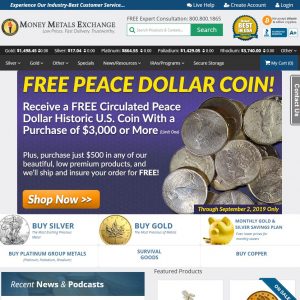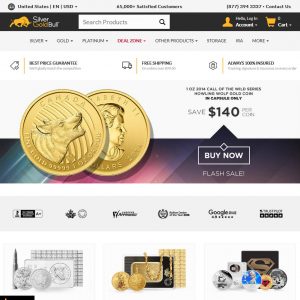Trusted Precious Metals Dealers
All investment gold companies listed in our Trusted Directory have been fully vetted, rated and reviewed as part of our 5-step verification process.
If you see a precious metals dealer listed you can be assured they provide a quality of service at the highest levels in the industry and importantly, get their clients the results they want without breaking the bank.
If they don’t cut it – they don’t get in. Simple.
Showing all 8 results
Avoiding Gold Investment Scams
Throughout history gold has been known as an excellent store of wealth – and in more recent times has been a proven investment hedge and portfolio diversifier, helping to stabilize portfolios during times of crisis.
It’s not surprising that this beautiful metal (along with it’s precious metal cousins silver, platinum and paladium) is a popular investment. It’s a highly concentrated and easily transportable form of wealth and in a time of liberal money-printing by state banks across the globe, for many precious metals are now considered to be the only “real” money left.
Unfortunately as with any popular high value commodity, gold has more than it’s fare share of connected scams and frauds. Ignoring the obvious “Nigerian princes” looking to unload discounted gold by the shipload, or offers to sell gold dust way below the market price, what scams are there to look out for?
Bullion scams often involve false claims about content, rarity or value.
Fake gold. Increasingly sophisticated, gold bars and coins are being manufactured with a thick layer of real gold on the outside and a tungsten or similarly dense core. To give an idea of the scale of the problem Banks have found over 1000 1kg bars – worth over $50M – in their vaults in the past 3 years alone – bars that had initially passed all their authenticity tests.
There are other less sophisticated gold bars and coins elsewhere in the market with well-known auction sites selling counterfeit gold over their platforms being a common occurrence. Simple tests and even basic visual checks can spot most of these fakes, but every year there are more and more of these fakes being sold as genuine.
Private mints also issue coins that look very like bullion coins minted by foreign governments, but may have little or no gold content. Although not minted to be an intentional fraud, these non-precious coins quickly find their way onto the secondary market where they can catch out people who are new to gold investing.
Collectables. There’s a large market in collectable gold coins (numismatics) and some of these coins command prices significantly higher than their gold content due to rarity. It’s a specialized market and requires an expert knowledge to ensure the right prices are paid for the right coin.
Unfortunately scammers have latched onto the idea of collectibles and are selling regular bullion coins or relatively worthless old coins as being collectible – and pocketing a sizeable profit over their true value by selling to the unwary. We recommend precious metals investors stick to standard bullion bars and coins only.
High Fees. Gold is a commodity and despite it’s high price per ounce, carries very little profit for a gold dealer. Unscrupulous gold dealers make up for this by charging high fees for their services such as vaulting or re-stocking when buying back.
Leveraged Investment. A leveraged investment is where some money is borrowed to make an investment. All is well when the investment value is rising ahead of interest and other fees but in a slow or downward market, costs can soon overtake value leaving the investor with less than he or she started.
Typically, in a leveraged gold investment scam, a dealer will suggest that gold is about to skyrocket and by paying as little as 20 percent of the metal value, they can give you the benefits of 100% of the gold. In reality they are lending you 80% at high interest and charging inflated storage fees – so even in a moderately buoyant market you can end up losing your initial investment money, fees and interest paid – and the gold – if the inflated costs overtake the metal’s value and the dealer makes an “equity call”!
So how can you protect yourself when buying investment precious metals?
- Only use legitimate and trusted companies, such as those we list above. You can be sure that you’re buying genuine metals at reasonable premiums and reasonable delivery or vaulting costs
- Do not deal with companies who call you – be the one to reach out to the company.
- Check a company’s credentials at the BBB and with your local Chamber of Commerce if they are in-state.
- Read online reviews – is there a pattern of complaints with the company concerned?
Finally, if they mention leverage, confiscation or collectables – go elsewhere.
Example Cases
FTC Charges Gold, Silver Investment Scheme with Fraud
FTC Obtains Court Order Requiring Owner of Precious Metals Investment Scam To Surrender Florida Home Bought With Ill-Gotten Gains
Message sent, message received: Precious metal marketers agree to FTC settlement.











